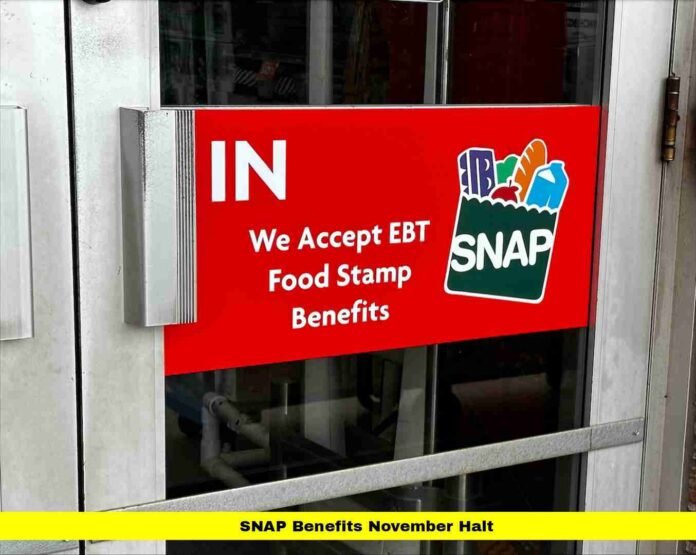Millions of Americans are facing uncertainty as a SNAP benefits November halt looms due to the ongoing federal government shutdown. The U.S. Department of Agriculture (USDA) has warned that if the shutdown continues, funding for November Supplemental Nutrition Assistance Program (SNAP) benefits may not be available, putting low-income households at risk of missing essential food assistance.
Why November SNAP Benefits Are at Risk
The federal government shutdown, which began in early October 2025, has disrupted funding for numerous federal programs, including SNAP. While October benefits were distributed on schedule, November payments are now uncertain. The USDA has notified states that without federal appropriations, it cannot guarantee timely issuance of SNAP benefits next month. This pause in funding means states may have to delay or halt benefit distributions until the shutdown is resolved.
States Affected by the Halt
Several states have already begun preparing for the potential halt of SNAP benefits in November. Some states have issued warnings to recipients about the possibility of delays or paused payments. States most affected include Pennsylvania, Texas, South Carolina, and Oklahoma, among others. Agencies are alerting beneficiaries to plan ahead and seek additional food resources if necessary. States are also emphasizing that the situation will continue to evolve depending on federal budget resolutions.
Impact on Low-Income Families
A halt in SNAP benefits could significantly affect low-income households that rely on the program to meet basic nutritional needs. Families who depend on monthly EBT cards for groceries may face challenges purchasing essential items. For many, SNAP benefits are the primary source of food support, and missing a month could lead to increased reliance on food pantries and local assistance programs. The financial strain may be further compounded by rising grocery prices and ongoing economic pressures.
Preparing for Potential Disruptions
Recipients of SNAP benefits can take steps to mitigate the impact of the halt. First, budgeting any remaining funds on current EBT cards can help extend resources until benefits resume. Contacting local food banks and community pantries provides additional support and access to meals during the interruption. Staying informed through state social services departments is critical, as updates regarding the resumption of benefits will be communicated through official channels. Beneficiaries can also advocate for swift government action by reaching out to elected representatives to emphasize the urgency of restoring funding.
Possible Contingency Measures
State agencies are exploring contingency measures to support families if the SNAP benefits November halt takes effect. These measures may include coordinating with local food banks, community centers, and nonprofit organizations to ensure that vulnerable populations receive assistance. While federal funds are paused, states are also evaluating emergency programs to distribute food or provide temporary financial support where possible. These measures aim to reduce the immediate hardship caused by the funding gap.
What Happens Next
The continuation of the government shutdown will determine the duration and extent of SNAP disruptions. If a resolution is reached before the end of October, states may be able to issue November benefits on schedule. However, if the shutdown persists, beneficiaries should expect delays, partial payments, or temporary halts. The situation remains fluid, and affected individuals are encouraged to plan accordingly, maintain communication with state agencies, and utilize local assistance networks.
Key Advice for SNAP Recipients
During this uncertain period, SNAP recipients should focus on managing resources wisely. Careful budgeting of existing EBT balances is essential. Engaging with community food assistance programs can help bridge the gap while benefits are paused. Remaining informed through official state channels ensures that recipients receive the latest information about potential distribution dates. Additionally, reaching out to local representatives can help express community concerns and encourage swift resolution of federal funding issues.
The Broader Implications
The potential halt of SNAP benefits underscores the wider impact of federal government shutdowns on essential social programs. Millions of households rely on government assistance for basic needs, and disruptions can quickly lead to food insecurity. State agencies, nonprofits, and communities play a critical role in mitigating these effects, but the underlying solution depends on federal appropriations. Ensuring timely funding of SNAP and other programs is crucial to protect vulnerable populations from the consequences of administrative delays.
Looking Ahead
As the situation develops, beneficiaries should remain vigilant and proactive. Tracking official announcements from state social services departments will provide the earliest notice of any changes to SNAP benefit distribution. Preparing alternative resources, such as local food banks or community support networks, can help families manage during potential disruptions. Ultimately, the resolution of the government shutdown will determine whether November SNAP benefits are issued on time, delayed, or temporarily halted.
Staying informed, planning ahead, and utilizing available resources are essential strategies for navigating this challenging period. SNAP recipients are encouraged to act early and remain adaptable until federal funding is restored.
